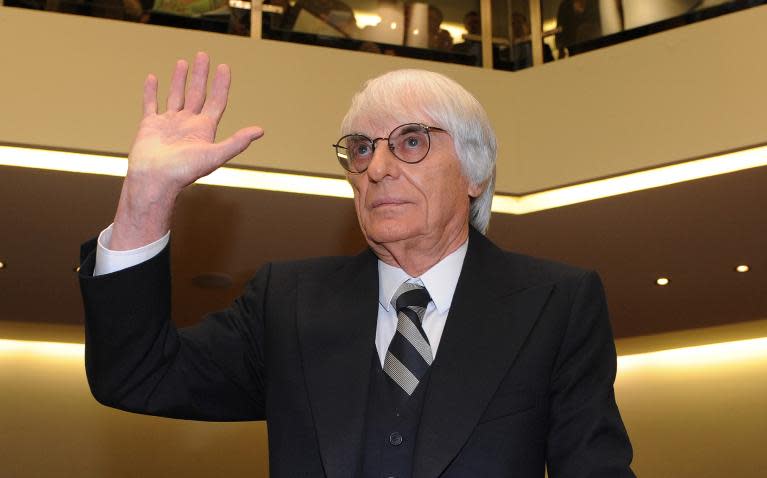German bribery trial threatens Ecclestone's F1 reign
Formula One supremo Bernie Ecclestone goes on trial in Germany on Thursday facing bribery charges in a case which threatens his nearly 40-year-reign of the motor sport. The 83-year-old Briton denies charges of bribery and abetting breach of trust in relation to a $44 million (31.8 million euro) payment he made to former German banker Gerhard Gribkowsky, who has since been jailed. The case will once more throw the spotlight on the diminutive but brash billionaire-sports magnate sometimes dubbed "Napoleon" who rose from being a used car salesman to control the high-octane sport since the 1970s. Ecclestone has denied plans to seek a plea bargain and insisted: "I'm going into this trial to prove my innocence of what I have been charged with". The crux of what is scheduled as a months-long trial will be why he paid Gribkowsky millions in 2006 -- Ecclestone says he was blackmailed, the German banker says it was a bribe. The 256-page indictment against the octogenarian paints a picture of a man desperate to protect his sporting empire at all costs. The complex case revolves around Formula One rights that German bank BayernLB in 2006 sold to Britain's CVC Capital Partners for $830 million. Ecclestone received a $66 million commission from Gribkowsky as part of the deal, then allegedly gave him back $44 million. Prosecutors suspect this was meant to ensure that CVC would get the rights, to allow Ecclestone to maintain tight control over the Formula One business. The F1 boss claims he paid Gribkowsky because the German was threatening to cause trouble for Ecclestone with British tax authorities. "Right now, I'm the loser, because people are gossipping about me, without really understanding what it's about," Ecclestone recently told German broadcaster ARD. Gribkowsky, the former chief risk officer at Bayern LB, was jailed for eight-and-a-half years in 2012 for bribe-taking after a trial in which Ecclestone testified. - 'Charm and sophistication' - Ecclestone now faces the same judge who convicted Gribkowsky, Peter Noll. Noll, in sentencing Gribkowsky, said he viewed the Briton as the driving force who had used his “charm and sophistication” to lead the banker into criminality. Gribkowsky is set to give evidence in Ecclestone's trial, which could lead to a jail term if the Briton is found guilty. With 26 days of hearings initially scheduled and a verdict not expected before mid-September, Ecclestone has reduced his role in the running of Formula One pending the outcome of the trial. He is set to be in court two days per week, a schedule designed to allow him to attend races, although he missed last Sunday's Chinese Grand Prix in Shanghai to prepare for the case. Formula One's future could be determined by events in the Munich regional court room. Donald Mackenzie, co-founder of CVC Funds, the sport's majority shareholder, told Britain's High Court last year that Ecclestone would be fired if he was found to have committed a criminal offence. Ecclestone rose to become Formula One's supremo having failed to make it as a driver in the 1950s. He bought the Brabham team in 1972 and his control of the sport grew from his pioneering the sale of television rights in the late 1970s. He became the CEO of FOCA, the Formula One Constructors Association, in 1978 which put him on the path to become head of the sport. A controversial figure, he had to apologise for making sexist comments in 2005 when he said women should be "dressed in white like all the other domestic appliances". Then in 2009 he drew widespread criticism for saying he admired Adolf Hitler for being "able to get things done".




